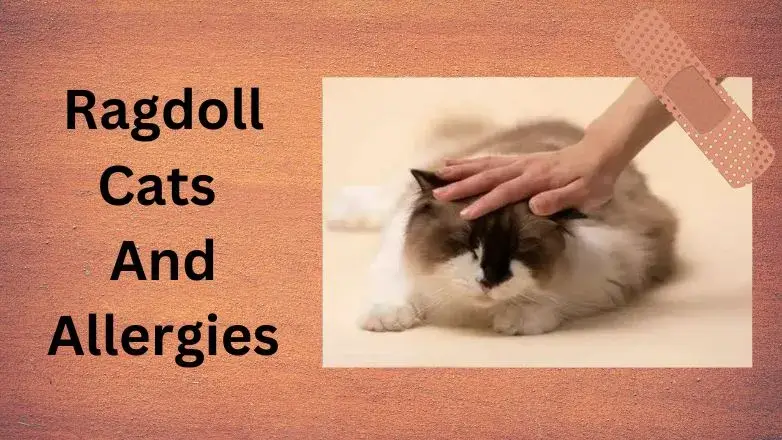Understanding Ragdoll cats and allergies is crucial before deciding to adopt this particular cat breed and bringing it into your home.
The Ragdoll cat stands out as a distinctive feline companion. Renowned for its sociable nature, easygoing temperament, and profound affection, the Ragdoll is notably gentle and revels in being gently caressed. It’s important to be aware that Ragdoll cats may grapple with skin allergies, a consideration that should weigh on prospective adopters.
Similar to other cat breeds, Ragdolls can be prone to various skin issues, encompassing allergies, infections, and mites. Common culprits for feline allergies comprise fleas, certain foods, and environmental elements. Let’s delve into understanding Ragdoll cats and the allergies that may impact them.
Contents
List Of Ragdoll Cats And Allergies
Below is a compilation of Ragdoll cat allergies affecting along with concise descriptions of their associated symptoms:
Allergic Rhinitis
Certain Ragdoll cats may be sensitive to dust, pollen, or mold, potentially leading to chronic rhinitis or allergic rhinitis. This common allergy in cats can manifest through symptoms such as excessive grooming due to itchiness, nasal discharge, sneezing, and pawing at the face.
Allergies to food or ingredients
Allergies in cats, including Ragdolls, can lead to gastrointestinal issues, with symptoms encompassing vomiting and diarrhea. Additionally, food allergies may manifest as dermatological problems like skin rashes and, in severe cases, anaphylaxis. Some Ragdoll cats may develop an intolerance to specific foods.
These food-related issues typically arise between the ages of two to six years, presenting symptoms such as vomiting, diarrhea, flatulence, decreased appetite, itchiness, hair loss, or reddened skin. In extreme cases, a life-threatening reaction known as food anaphylaxis may occur, marked by severe symptoms like hives, throat swelling, difficulty breathing, vomiting, diarrhea, and seizures.
Ragdoll cats can be sensitive to various foods, including but not limited to chicken, beef, fish, egg, milk, corn, soy, and shellfish. Identifying and managing these sensitivities is crucial for the well-being of the feline companions.
Allergies to the environment
Cats, including Ragdolls, may experience respiratory issues such as coughing, sneezing, and even asthma due to environmental allergies. Various environmental triggers, including pollen, dust, molds, pet dander, and dust mites, can contribute to the development of allergies in felines. Identifying and addressing these environmental factors is essential to manage and alleviate respiratory symptoms in affected cats.
Inhalant allergies
In Ragdoll cats, inhalant allergies are a prevalent type of allergy triggered by airborne substances. Cats with inhalant allergies may exhibit symptoms such as eye irritation, respiratory issues, and dermatological problems. Common airborne triggers include houseplants, plants, cleaning products, perfumes, and other environmental factors. Identifying and managing these inhalant allergies is crucial for maintaining the health and well-being of Ragdoll cats.
Skin allergies
Skin allergies, particularly those caused by fleas, are common in Ragdoll cats. Fleas can provoke significant irritation and inflammation, potentially triggering an allergic reaction in affected cats. Recognizing and addressing flea-related skin allergies is essential to ensure the comfort and health of Ragdoll cats. Regular flea prevention measures and prompt treatment can help mitigate the impact of these allergies on feline companions.
Read Also: Snowshoe Cat vs Ragdoll | Decoding Differences
Treating Ragdoll Cat Allergies
When dealing with allergies in Ragdoll cats, it’s essential to approach the situation similarly to other allergy-prone cats. If you observe signs of allergies in your cat, consult your veterinarian for proper diagnosis and medication to alleviate the symptoms.
For Ragdoll cats with allergies, consider the following home remedies:
- Vitamin C: Functions as an antihistamine, reducing allergy symptoms, and serves as an antioxidant to boost the immune system.
- Dietary Changes: If your cat is allergic to specific foods, a low-allergen diet may be beneficial. However, it may require some trial and error to find the most suitable option, considering potential allergies to certain types of food or ingredients.
- Vitamin E: Possesses anti-inflammatory properties that can aid in reducing allergy symptoms, particularly helpful for addressing skin irritation caused by mites and fleas.
- Environmental Care: Ensure a clean and allergen-free environment for your cat. Taking steps to eliminate potential allergens such as dust, mold, and pollen can contribute to your cat’s well-being.
Regular veterinary check-ups are crucial, especially if your cat is experiencing breathing difficulties. A veterinarian can provide a thorough examination and offer guidance on managing allergies effectively.
Final Words: Ragdoll Cats And Allergies
Many pet lovers often inquire about Ragdoll cats and the allergies that may affect them, seeking ways to create a clean and allergy-free environment at home. If you have pets in your household, it’s crucial to prioritize deep cleaning and provide them with appropriate nutrition to ensure their cleanliness and overall health.
Maintaining a clean and well-ventilated home is essential to prevent allergies from thriving. Regular cleaning routines and allowing fresh air to circulate freely can contribute to a healthier environment for both pets and their owners. Avoiding dirt and ensuring cleanliness in your living space is vital to create a welcoming and allergy-free home for you and your feline companions.
Read Also: What Health Problems Do Ragdoll Cats Have?
Read Also: 5 Ways On How To Reduce Ragdoll Shedding

Frequently Asked Questions
1. Do Ragdoll cats make you sneeze?
The question of whether Ragdoll cats trigger allergies is best answered by individuals who have allergies and may be specifically allergic to certain breeds. It’s important to note that Ragdoll cats are not classified as hypoallergenic; however, they tend to shed less than some other breeds.
Allergic reactions to cats can vary from person to person, and individuals with allergies should spend time with a specific breed to gauge their personal sensitivity before deciding to bring the cat into their home.
2. Are Ragdoll cats hypoallergenic?
Ragdoll cats are not hypoallergenic. However, due to their lack of an undercoat, they tend to shed less compared to some other cat breeds.
3. Do Ragdoll cats produce dander?
Dander is produced by all felines and is the most common cause of pet allergies.




